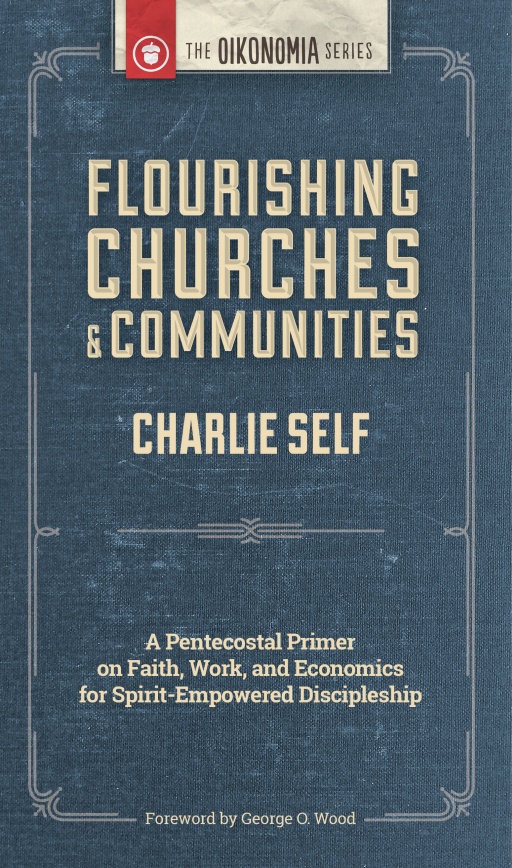 In the latest Journal of Markets and Morality, Joseph Gorra reviews Dr. Charlie Self’s new book, Flourishing Churches and Communities, calling it a “joyous, practical, and insightful primer to the integration of ‘faith, work, and economics” that will inspire “a pathway for leaders of Pentecostal thought to reflect on public life in a renewed way.”
In the latest Journal of Markets and Morality, Joseph Gorra reviews Dr. Charlie Self’s new book, Flourishing Churches and Communities, calling it a “joyous, practical, and insightful primer to the integration of ‘faith, work, and economics” that will inspire “a pathway for leaders of Pentecostal thought to reflect on public life in a renewed way.”
The book is one of four tradition-specific primers from the Acton Institute, and although it focuses specifically on a Pentecostal perspective, Gorra rightly observes that Self writes in a way that draws wide appreciation for the work of the Spirit in economic life. Avoiding “provincial understandings” of Pentecostals themselves, Self is careful to present Pentecostalism in a “nontriumphalistic manner,” Gorra writes, which mainstream evangelicals may find “accommodationist to many of their own theological sensibilities.”
As an example, the book seeks to highlight and illuminate five key principles, which on their face fit rather snugly within these discussions across Christianity as a whole:
- Work is good.
- Although sin has effaced human nature and work, it has not erased the divine nature in people and the ability to bring good to the world.
- God has reconciled the world to himself in Christ and is now working through the church to express the life of the kingdom in the present age.
- God the Holy Spirit actively energizes compassion for the poor and wealth creation for community flourishing.
- Cultural, economic, and social institutions are built on transcendent moral foundations.
As Gorra duly notes, numbers 4 and 5 are perhaps the most distinctly Pentecostal, demonstrating where Pentecostalism may offer its most distinct contribution to such matters:
Perhaps principles four and five are the most unique compared to quintessential “faith and work” discussions. For example, principle four witnesses to the fact that the Spirit’s activity is involved in acts of compassion and in “wealth creation for community flourishing.” The pious observer will readily acknowledge the former, but may find it mindblowing to recognize the truth of the latter. On the latter, Self is not endorsing a kind of prosperity gospel, which he critiques and rejects (21). His argument is related more to the purposes and stewardship of wealth creation for the good of others…
For example, by “Spirit-empowered discipleship,” he means a life that is led by the Spirit and is dependent on the Spirit’s enablement to fulfill Christ’s mission on earth…Who would not want that to infuse economic life? Which Christian tradition would deny the need for that? He is not claiming that disciples must speak in tongues in order to be empowered. However, he is trying to awaken readers to Spirit-empowered, life-giving-life that is not merely beneficial for one’s interior or religious life or for simply having an ecstatic experience. I wonder how Self would imagine the role and practice of Spirit-led discernment when understanding the morality of markets in order to better appreciate what freedom, virtue, and responsibility might look like in a particular situation.
This is indeed a significant gap in the current faith-work conversation. If economics is fundamentally about knowledge and human action, how are we to discern and engage and be guided and empowered in the day-to-day work of our hands, outside of a basic belief in Jesus and the Bible? How are we to connect the temporal to the transcendent in those “gray areas” of stewardship that are more typically left to reason and prudence and tradition alone?
We have heard a variety of good answers on this, to be sure, but few have exhaustively explored the role that the Holy Spirit plays in actively speaking and guiding and directing us in the most mundane circumstances. What implications does such a powerful and readily available source and stream of action have for the broader economic order? Why don’t Christians grab hold of it with more confidence?
With his book, Self has taken a strong step in furthering that conversation, and as Gorra concludes, it’s sure to empower and equip Christians as they continue on from ideal to reality.
—
Check out the latest issue of the Journal of Markets and Morality and follow on Facebook.
Check out Flourishing Churches and Communities and other primers in the series.

